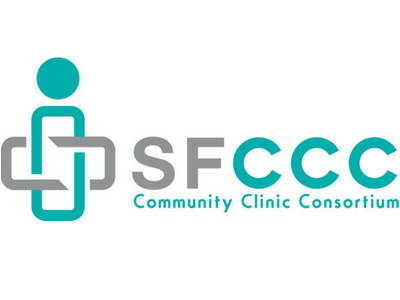NHC SF Member Blog: Learning to Serve
Caption: Vjola carries a box with rapid COVID-19 tests to distribute to patients and their families.
Hi everyone! My name is Vjola (she/her) and I am currently serving as the COVID-19 Responder/Care Experience Coordinator at the San Francisco Department of Public Health (SFDPH).
The first few seconds of my first call with a patient at the SFDPH felt like a lifetime. Despite weeks of training on COVID-19 results disclosure and electronic health record system navigation, I decided to spend those precious few seconds as the phone rang to once again review my call script. As the patient answered the call, I heard the confidence in my voice falter as I stumbled through my opening lines - a rough start. I got through the rest of the call and placed myself firmly in the “needs improvement” category.
I have engaged in many of these calls in the last few months in my role as COVID-19 Responder and Care Experience Coordinator. Some of the calls have revolved around COVID-19 results disclosure while others have focused on improving various quality metrics: pediatric immunization rates and management of chronic conditions like diabetes and hypertension, to name a few. While my confidence has improved drastically over the months, I no longer think about rating these patient interactions based on my performance on the call script or my speed in scheduling appointments. I now direct my efforts to making sure that I am as knowledgeable as possible about the services we offer in order to better aid my patients.
The San Francisco Health Network (SFHN) provides medical care to over 100,000 individuals across 14 different locations in the City. This partnership of clinics, hospitals, and programs is deeply committed to providing high-quality care and offers a myriad of services to its patient population regardless of immigration or insurance status. I remain in awe not only of the range of services, but also the speed at which the SFDPH and SFHN have been able to respond to the various health demands of our underserved patients. One example of such a response occurred at the peak of the Omicron surge in February of 2022, when our patients reported severely limited access to COVID PCR testing in the city and shared financial concerns about affording antigen tests. The SFDPH and SFHN quickly acted to address this care gap and were able to secure thousands of free at-home rapid tests, providing a vital resource for keeping our patient communities safe and healthy.
Learning about these comprehensive services and being able to extend them to my patients has been my favorite part of serving with the SFDPH so far. However, this task requires deep engagement and empathic listening, skills that extend beyond the prompts of a call script. I am proud to say that I continue to develop these skills from the patients I interact with, who teach me how to better serve every day.
About the Author:
Vjola Jorgji is one of the 2021-2022 NHC San Francisco Americorps Members. She is currently serving with the Population Health Management Team.


